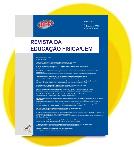The relative age effect on the development of soccer goalkeepers in Brazil: men and women elite scenarios
Abstract
In Brazil, soccer championships for children and adolescents are generally organized and divided into categories related to age groups (usually every two years), with the aim of promoting greater balance and fairness in the competition. Although they produce a certain scenario of proximity of performance capacities among the participants, on the other hand, such division includes and sustains some conditions of inequality in the offer of learning opportunities. This, coupled with socio-cultural and pedagogical issues, structures a phenomenon called the Relative Age Effect (RAE). The aim of this study was to analyze the occurrence of the EIR in goalkeepers of the Brazilian Men and Women Football Serie A Championships 2018. Information on the birth dates of the athletes was collected through the official website of the Confederation Brazilian Football. The men group was composed of 68 goalkeepers within a population of 73 individuals, while the women group was composed of 39 of a total of 43 goalkeepers. The chi-square test was used for statistical analysis. The results reveal that EIR does not happen in this population, in any gender. This may happen because there is less competition to play as goalkeepers in men and women football teams. It is concluded that, for both gender, the date of birth does not seem to influence the offer of opportunities for goalkeepers to reach the elite level of Brazilian football.
Downloads
Copyright (c) 2020 Journal of Physical Education

This work is licensed under a Creative Commons Attribution-NonCommercial-NoDerivatives 4.0 International License.
• Authors retain the copyright and full publishing rights without restrictions.

This work is licensed under a Creative Commons Attribution 4.0 International License.













_1502.jpg)











